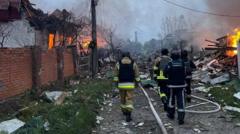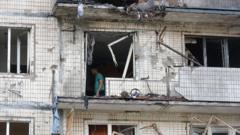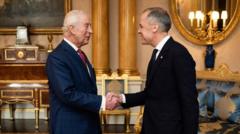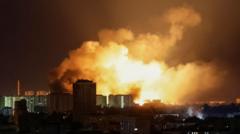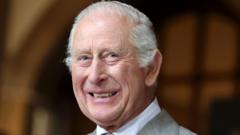Despite talks and phone calls, no tangible progress toward peace has been made, leading to uncertainty in the region.
**Russia's Recent Diplomacy: Confidence grows, yet peace in Ukraine remains elusive**
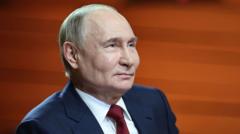
**Russia's Recent Diplomacy: Confidence grows, yet peace in Ukraine remains elusive**
As a series of high-stakes diplomatic interactions unfold, Russia demonstrates a growing confidence amidst ongoing conflict in Ukraine.
The clock strikes 2:30 AM, and I find myself aimlessly wandering the extensive Kremlin grounds, as I attempt to find an exit after a long night. The scene feels surreal, akin to a plot from a spy novel. My journey began with an anticipated event featuring President Putin, only to pivot into a lengthy waiting game where, instead of a press conference, the president delivered a pre-recorded statement proposing direct talks with Ukraine in Istanbul.
The atmosphere of the last two weeks has undeniably been tumultuous and complex. My initial experience at the Kremlin has been followed by peace discussions in Turkey and extensive dialogues between President Putin and Donald Trump. However, it remains unclear whether these discussions genuinely bring us closer to ending the ongoing conflict in Ukraine.
Speculation of direct peace talks is swirling around, yet concrete resolutions seem far away. Russia's stance remains firm, rejecting the notion of an unconditional and comprehensive ceasefire and showing no signs of relinquishing control over Ukrainian territories. On the contrary, Moscow's aggressiveness persists, suggesting it seeks further territorial claims.
Observations from the past fortnight have revealed various layers of Russia’s negotiating tactics under pressure. While some critics perceive these strategies as building time for further maneuvering, they reflect Russia's adeptness in deflecting confrontational measures from Western powers. After European leaders issued an ultimatum to Putin for a ceasefire, Russia quickly countered by proposing the Istanbul negotiations, appeasing both Trump and European leaders momentarily without committing to any real concession.
Aspects of contention remain, particularly regarding the legitimacy of Ukrainian President Volodyr Zelensky in the eyes of the Kremlin, with Russian officials casting doubt on any agreements made with him due to political struggles back home. The narrative coming from Russian outlets proudly suggests that Russia has maneuvered itself advantageously within recent international discussions, benefitting from Trump's aligned views on negotiations.
Yet, despite the apparent diplomacy, the conflict continues unabated, and repercussions loom large. Trump's administration, keen on revamping relations with Russia, might inadvertently embolden the latter's stance on the conflict. Even as the U.S. faces mounting pressure to impose sanctions should there be no movement towards peace, the Kremlin remains unfazed, suggesting it can sidestep such pressure effectively.
As discussions continue and diplomatic exchanges expand, one thing has become increasingly clear: while Russia navigates this diplomatic landscape with confidence, the road to peace in Ukraine remains obscured and fraught with uncertainty.
The atmosphere of the last two weeks has undeniably been tumultuous and complex. My initial experience at the Kremlin has been followed by peace discussions in Turkey and extensive dialogues between President Putin and Donald Trump. However, it remains unclear whether these discussions genuinely bring us closer to ending the ongoing conflict in Ukraine.
Speculation of direct peace talks is swirling around, yet concrete resolutions seem far away. Russia's stance remains firm, rejecting the notion of an unconditional and comprehensive ceasefire and showing no signs of relinquishing control over Ukrainian territories. On the contrary, Moscow's aggressiveness persists, suggesting it seeks further territorial claims.
Observations from the past fortnight have revealed various layers of Russia’s negotiating tactics under pressure. While some critics perceive these strategies as building time for further maneuvering, they reflect Russia's adeptness in deflecting confrontational measures from Western powers. After European leaders issued an ultimatum to Putin for a ceasefire, Russia quickly countered by proposing the Istanbul negotiations, appeasing both Trump and European leaders momentarily without committing to any real concession.
Aspects of contention remain, particularly regarding the legitimacy of Ukrainian President Volodyr Zelensky in the eyes of the Kremlin, with Russian officials casting doubt on any agreements made with him due to political struggles back home. The narrative coming from Russian outlets proudly suggests that Russia has maneuvered itself advantageously within recent international discussions, benefitting from Trump's aligned views on negotiations.
Yet, despite the apparent diplomacy, the conflict continues unabated, and repercussions loom large. Trump's administration, keen on revamping relations with Russia, might inadvertently embolden the latter's stance on the conflict. Even as the U.S. faces mounting pressure to impose sanctions should there be no movement towards peace, the Kremlin remains unfazed, suggesting it can sidestep such pressure effectively.
As discussions continue and diplomatic exchanges expand, one thing has become increasingly clear: while Russia navigates this diplomatic landscape with confidence, the road to peace in Ukraine remains obscured and fraught with uncertainty.




